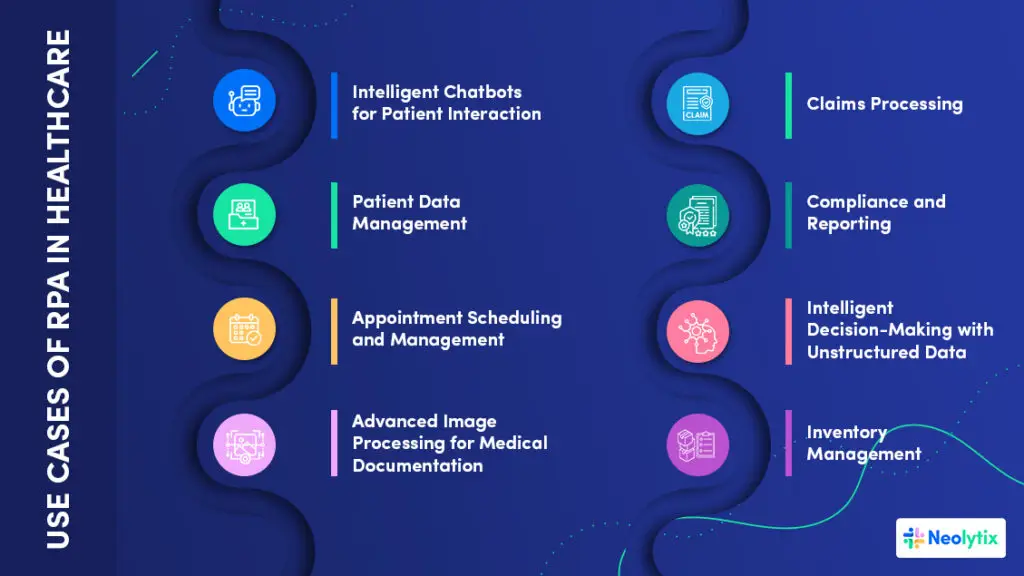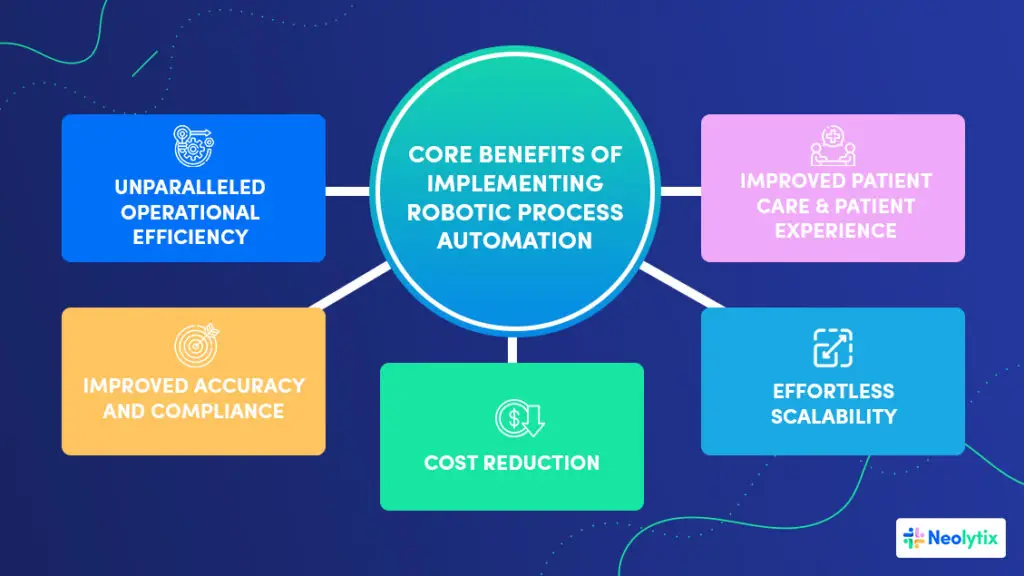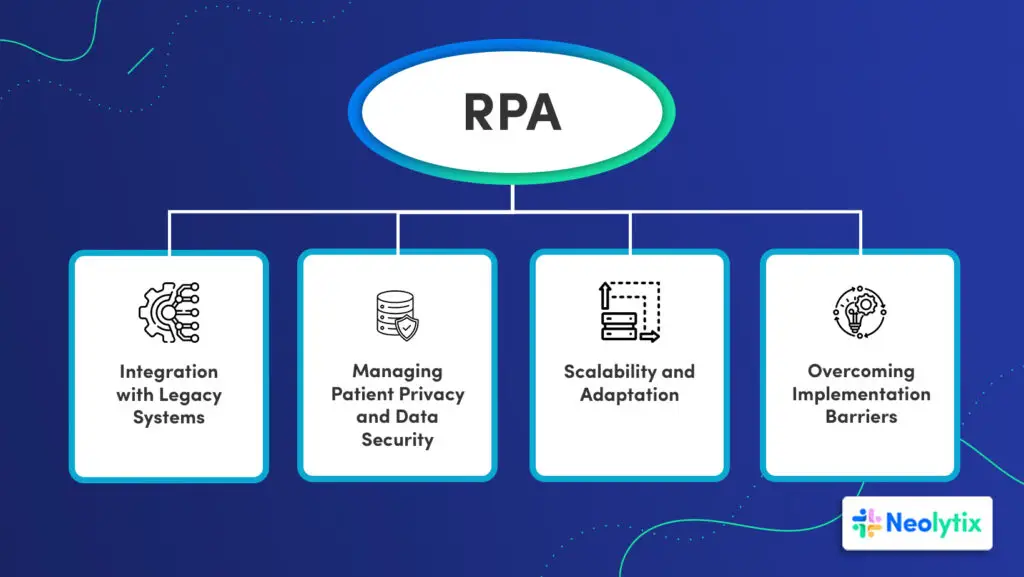Consider the vast expanse of data and the amount of administrative tasks that form the backbone of the healthcare industry. In this complex network, Robotic Process Automation (RPA) is a powerful tool. It improves processes that used to require a lot of human time and effort.
Using RPA in healthcare means more than just using new technology. It involves changing how healthcare works to make it more accurate, improve patient care, and lower costs.
What is Robotic Process Automation in Healthcare?
Robotic Process Automation (RPA) uses software robots to replace repetitive, error-prone tasks that humans used to do. Some of these tasks include data entry, appointment scheduling, patient record management, and more. By integrating with existing digital systems, RPA in healthcare enhances efficiency, accuracy, and productivity. This allows healthcare professionals to focus on more critical and value-added work, ultimately improving patient care and operational performance.
Major Robotic Process Automation (RPA) Use Cases in Healthcare
These examples show how RPA technology and Gen AI can improve healthcare processes, making them more efficient and effective. They highlight various robotic process automation use cases in healthcare that drive significant improvements.

1. Intelligent Chatbots for Patient Interaction
Enhanced Patient Communication:
Gen AI can empower RPA-based chatbots to deliver more personalized and context-aware interactions. Smart chatbots can answer patient questions, provide medical advice, and assist with patient sorting. This not only makes accessing healthcare easier for patients but also reduces the workload for medical staff.
Support for Multilingual Interactions
RPA chatbots can learn to speak different languages, helping diverse patients access healthcare and improving communication accuracy.
2. Patient Data Management
RPA bots can automatically update and manage patient records in Electronic Health Records (EHR) systems. This ensures that patient records are accurate and up-to-date, reducing errors and enhancing the quality of patient care. This is a prime example of RPA applications in healthcare.
3. Appointment Scheduling and Management
RPA also improves the efficiency and reliability of appointment scheduling systems. Automating scheduling in healthcare can help reduce missed appointments, improve staff efficiency, and ensure patients are seen on time. This is one of the most beneficial RPA use cases in healthcare.
4. Advanced Image Processing for Medical Documentation
Improved Document Readability: Improve scanned medical documents or images with Gen AI to make them easier to read, especially for RPA systems.
Gen AI enhances image quality to assist RPA systems in quickly extracting and processing information from medical records and imaging studies. This enhancement allows RPA systems to work more efficiently when analyzing medical data. Gen AI enhances image quality for RPA systems to accurately extract and process information from medical records and imaging studies.
Automated Image Analysis: Gen AI can help RPA systems in radiology by analyzing medical images, identifying patterns, and suggesting preliminary diagnoses. This accelerates patient care processes and saves time. Such examples of RPA in healthcare highlight its transformative potential.
5. Claims Processing
Automation of Insurance Claims: The automation of insurance claims processing is another area where RPA can significantly make an impact. RPA makes the claims process faster and more accurate by reducing administrative tasks from start to finish, being a critical use case for robotic process automation in the healthcare sector.
6. Compliance and Reporting
Regulatory compliance: RPA also aids healthcare organizations in maintaining compliance with various regulations. RPA helps healthcare providers meet regulatory requirements more efficiently. It does this by automating report generation and submission. These are essential RPA compliance use cases which also ensure proper record maintenance to reduce errors, making it vital application of RPA in healthcare.
7. Intelligent Decision-Making with Unstructured Data
- Predictive Analytics: RPA can predict patient outcomes, forecast resource needs, and identify potential health risks by analyzing data patterns. This proactive approach can significantly improve healthcare delivery and patient management.
- Analyzing Unstructured Data: While traditional RPA systems are adept at structured data, Gen AI can analyze unstructured data such as clinical notes, medical journals, and research papers. This allows RPA bots to extract valuable insights and support healthcare professionals in making informed decisions.
8. Inventory Management
When it comes to RPA use cases in healthcare, there’s also healthcare facilities. Managing medical supplies inventory is critical. RPA can help track stock levels, reorder items, and manage supply distribution in a facility.
These are some of the best RPA use cases that go hand-in-hand with the core benefits that we’ll discuss in the following section.

Core Benefits of Implementing Robotic Process Automation in Healthcare Setting
Healthcare robotic process automation offers numerous benefits, such as:
Unparalleled Operational Efficiency
RPA saves time and money by automating manual tasks. By automating these tasks, healthcare organizations can redirect resources toward more critical, value-added activities.
Improved Accuracy and Compliance
RPA minimizes the risk of human error in data handling, which is crucial for maintaining compliance with healthcare regulations. Automated processes ensure consistent application of rules and standards, significantly reducing the risk of compliance-related issues.
Cost Reduction
By automating tasks that were previously done manually, robotic process automation (RPA) in healthcare can significantly reduce labor costs. RPA helps decrease overtime costs and minimizes errors in billing and claims processing. Investing in RPA technology upfront can lower operational costs over time, resulting in a substantial return on investment. RPA in medical billing is a prime example of a cost-saving applications, as it automates repetitive tasks and ensures accuracy. , as it automates repetitive tasks and ensures accuracy.
Improved Patient Care & Patient Experience
Healthcare robotic process automation enhances patient care by automating scheduling and data management, leading to shorter wait times and a more personalized approach to care. Patients receive faster, more precise healthcare, increasing their satisfaction and trust in the system. RPA for hospitals can streamline various processes, allowing medical staff to focus more on patient interaction and care.
Effortless Scalability
RPA solutions are highly scalable and capable of handling increasing volumes of tasks without a proportional increase in resources. This scalability makes RPA ideal for growing healthcare organizations looking to expand their operations without incurring significant additional costs. RPA use cases in healthcare show that scalable solutions can adapt to the changing needs of healthcare facilities, ensuring continuous improvement and efficiency.
Challenges in Robotic Process Automation Implementation
Implementing robotic process automation in the healthcare industry can be challenging due to several factors. These challenges include integrating with existing IT systems, high setup costs, and managing data security. However, these can be overcome with strategic planning and the right solutions.

Integration with Legacy Systems
Many healthcare facilities operate with legacy systems that may not be immediately compatible with the latest RPA technologies. These older systems can be inflexible, often requiring complex and costly modifications to integrate with new automation tools.
Solution
Using middleware or APIs to connect RPA solutions with legacy systems minimizes the need for extensive system overhauls. Choosing RPA solutions with customizable integration options or consulting experienced vendors can ease integration. RPA case studies in healthcare highlight successful integrations that have streamlined operations and reduced costs.
Managing Patient Privacy and Data Security
Robotic process automation in healthcare involves handling and processing vast amounts of sensitive patient data. Protecting data privacy and security is crucial, especially under strict regulations like HIPAA in the U.S. Automating data handling can pose a higher risk of breaches if not implemented correctly.
Solution
Implementing RPA solutions that are designed with robust security features is vital. Healthcare organizations must ensure that RPA tools adhere to security standards. They should also encrypt data during transfer and storage.
Regular security audits and updating RPA systems to patch any vulnerabilities can also help protect sensitive data. RPA compliance use cases demonstrate how stringent security measures can safeguard patient information. In this context, training staff on best practices for data security in the context of RPA can further mitigate risks.
Scalability and Adaptation to Changing Regulations
As healthcare regulations evolve and patient data volumes grow, RPA systems may struggle to adapt and scale effectively. This is particularly challenging when RPA deployments initially configured for specific tasks need to accommodate new requirements or expanded scopes without significant reconfiguration.
Solution
To address this challenge, healthcare organizations should prioritize RPA solutions that offer modular and flexible architectures. This allows for easier updates and scalability as needs change.
Using RPA platforms with AI and machine learning can help adapt to new data patterns and regulatory changes more effectively. A dedicated team for RPA governance ensures compliance with changing regulations, aligning with company policies and external requirements.
Overcoming RPA Implementation Barriers
Healthcare organizations can overcome RPA implementation barriers by:
1. Following Best Practices:
Adopting guidelines and best practices ensures a smooth implementation process.
2. Staff Training:
Comprehensive staff training programs ensure all users are comfortable and proficient with the new technology.
3. Choosing the Right RPA Partner:
RPA case studies in healthcare often emphasize the importance of a knowledgeable partner. Selecting an RPA partner with healthcare expertise can customize solutions to meet healthcare needs and compliance standards.
RPA Applications in Healthcare Setting
Exploring various use cases of RPA in healthcare can provide insight into its transformative potential. Examples include robotic process automation for medical billing, which ensures accuracy and efficiency, and robotic process automation for healthcare, which enhances patient care and administrative processes.
Robotics process automation in healthcare covers numerous functions, from data entry to compliance reporting. Implementing robotic process automation RPA in healthcare allows for scalable solutions that adapt to changing regulations and patient needs. RPA for medical billing is just one area where automation reduces errors and improves financial outcomes.
The synergy of RPA and healthcare shows how RPA in healthcare can revolutionize traditional practices and enhance overall service quality.
Guidelines and Best Practices for Robotic Process Automation Implementation in the Healthcare System
Robotic Process Automation (RPA) in healthcare requires careful planning and following best practices to ensure success and compliance. It is important to carefully plan and follow best practices when implementing RPA in healthcare. This will help ensure that the use of RPA in healthcare is successful and compliant. Here are some factors to consider for effective RPA implementation in healthcare settings:
Selecting the Right Processes to Automate
- Identify High-Volume, Low-Complexity Tasks: Start with processes that are repetitive and time-consuming yet require minimal human decision-making, such as data entry, appointment scheduling, and standard reporting.
- Assess Automation Readiness: Evaluate the existing IT infrastructure and determine whether adjustments are needed to accommodate RPA. Ensure that the data inputs are standardized and that workflows are well-documented.
Ensuring Data Security
- Implement Robust Security Measures: Since healthcare data involves sensitive patient information, it’s crucial to use RPA solutions that provide end-to-end encryption and secure access protocols.
- Regular Audits and Updates: Conduct regular security audits to assess the effectiveness of security measures. Keep the RPA software and related systems updated to protect against vulnerabilities.
Regulatory Considerations and Compliance
The automation of healthcare processes must navigate a complex landscape of legal and regulatory considerations:
Understanding Key Regulations
- HIPAA Compliance: In the U.S., HIPAA requires the protection and confidential handling of protected health information. RPA must be configured to handle data transfers, access, and storage with utmost security.
- GDPR Considerations: For organizations operating in or handling data from Europe, GDPR imposes strict guidelines on data consent, data minimization, and processing transparency.
Ensuring Continuous Compliance
- Regular audits: Use RPA to schedule checks and create reports to make sure legal standards are being followed.
- Update and Adaptation: Stay informed about changes in healthcare regulations and adjust RPA operations to maintain compliance. This includes updating privacy policies and procedures as regulations evolve.
Choosing the Right Robotic Process Automation Solution
To be successful, Robotic Process Automation in healthcare must be tailored to the specific needs of the industry. Important criteria to consider include:
- Seamless Integration: The RPA solution should be compatible with existing healthcare systems, such as Electronic Health Records (EHRs) and billing software, requiring minimal adjustments.
- Vendor Support: Adequate vendor support is crucial for troubleshooting issues, providing updates, and ensuring the RPA system evolves with the healthcare organization’s needs.
- Security: Strong security measures are essential to protect patient data and comply with healthcare regulations like HIPAA.
- Scalability: The RPA platform needs to grow with the healthcare organization, handling more work without slowing down.
Transformative Potential of Robotic Process Automation in Healthcare
Robotic Process Automation holds significant transformative potential for the healthcare industry. By automating routine tasks, RPA not only enhances operational efficiencies but also improves the accuracy of patient data management and compliance reporting.
Healthcare organizations need to view RPA as essential for modernizing and increasing efficiency, not merely as a technology investment but as a crucial component of strategic planning. RPA in healthcare case studies show that implementing RPA can lead to substantial improvements in operational performance and patient outcomes.
Enhance Your Healthcare Operations with Neolytix’s Hyper Automation Solutions
Neolytix offers Robotic Process Automation services for healthcare management. These services aim to enhance efficiency and improve patient care in your practice. With over 12 years of expertise in Healthcare Revenue Cycle Management, Medical Credentialing Services, and Expert Medical Billing Services, Neolytix equips your practice with the tools needed for financial optimization.
Neolytix is leading the efficiency evolution with our Hyper Automation solution for healthcare providers, ensuring your practice reaches its true potential. Our solutions address various RPA use cases in healthcare, helping organizations achieve their operational goals efficiently and effectively.
Contact us today for a free demonstration of how RPA can benefit your healthcare organization.
Get a Complementary Consultation for Healthcare Automation



